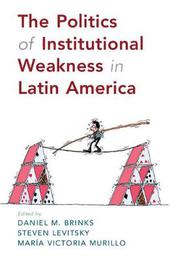
|
The Politics of Institutional Weakness in Latin America
Paperback / softback
Main Details
| Title |
The Politics of Institutional Weakness in Latin America
|
| Authors and Contributors |
Edited by Daniel M. Brinks
|
|
Edited by Steven Levitsky
|
|
Edited by Maria Victoria Murillo
|
| Physical Properties |
| Format:Paperback / softback | | Pages:376 | | Dimensions(mm): Height 227,Width 152 |
|
| ISBN/Barcode |
9781108702331
|
| Classifications | Dewey:320.98 |
|---|
| Audience | | Professional & Vocational | | Tertiary Education (US: College) | |
|---|
| Illustrations |
Worked examples or Exercises; 22 Tables, black and white; 2 Maps; 5 Line drawings, black and white
|
|
Publishing Details |
| Publisher |
Cambridge University Press
|
| Imprint |
Cambridge University Press
|
| Publication Date |
11 June 2020 |
| Publication Country |
United Kingdom
|
Description
Analysts and policymakers often decry the failure of institutions to accomplish their stated purpose. Bringing together leading scholars of Latin American politics, this volume helps us understand why. The volume offers a conceptual and theoretical framework for studying weak institutions. It introduces different dimensions of institutional weakness and explores the origins and consequences of that weakness. Drawing on recent research on constitutional and electoral reform, executive-legislative relations, property rights, environmental and labor regulation, indigenous rights, squatters and street vendors, and anti-domestic violence laws in Latin America, the volume's chapters show us that politicians often design institutions that they cannot or do not want to enforce or comply with. Challenging existing theories of institutional design, the volume helps us understand the logic that drives the creation of weak institutions, as well as the conditions under which they may be transformed into institutions that matter.
Author Biography
Daniel M. Brinks is Professor of Government and of Law and Chair of the Government Department at the University of Texas, Austin. Dan's research focuses on the role of the law and courts in supporting democracy and human rights. His most recent book (with Abby Blass) is The DNA of Constitutional Justice in Latin America (2018), winner of the Corwin Award for Best Book on Law and Courts awarded by the Law and Courts Section of the APSA. Steven Levitsky is David Rockefeller Professor of Latin American Studies at Harvard University, Massachusetts. He is co-author of How Democracies Die (2018), a New York Times Best-Seller published in 15 languages. His other books include Transforming Labor-Based Parties in Latin America (2003) and (with Lucan Way) Competitive Authoritarianism (2010). He is currently writing a book on the durability of revolutionary regimes. Maria Victoria Murillo is a Professor in the Department of Political Science and the School of International Affairs and the Director of the Institute for Latin American Studies at Columbia University, New York. She is the author of Labor Unions, Partisan Coalitions, and Market Reforms in Latin America (2001), Political Competition, Partisanship, and Policymaking in the Reform of Latin American Public Utilities (2009), and (with Ernesto Calvo) Non-Policy Politics (2019).
Reviews'With this book, some of the best scholars in comparative politics hit a home run. The book is both a major contribution to institutional analysis and the best substantive overview of contemporary Latin American politics that I have read in many years.' James Mahoney, Northwestern University 'An all-star roster of scholars explores Latin America's most persistent political puzzle - the origins and impact of weak institutions. Institutional incapacity has a variety of faces, from insignificance by design, to non-compliance, to instability. Which version we observe can tell us a lot about the political forces at play. But you need a map, and you need to know how to read it. Brinks, Levitsky, and Murillo are master cartographers.' John M. Carey, Wentworth Professor in the Social Sciences, Dartmouth College 'Kudos to Brinks, Levitsky, and Murillo for this impressive volume. They have produced an agenda-setting book, including leading scholars, that significantly advances our conceptual, theoretical, and empirical understanding of institutional fragility in Latin America. The volume challenges the idea that weak institutions are an accident. To explain variations in institutional significance, stability, enforcement, and compliance, the book examines the coalitional bases, strategic causes, and political uses of a wide range of institutions and cases. This volume is a must read for comparative scholars interested in institutions, in general, and Latin American politics, in particular.' Deborah J. Yashar, Princeton University 'The editors of and contributors to this collection offer an important conceptual framework to explain why the formal institutions created ...' S. L. Rozman, Choice 'It is an agenda-setting book, with important theoretical and empirical contributions that are key to better understand politics in the region and elsewhere.' Laura Gamboa, Comparative Politics
|